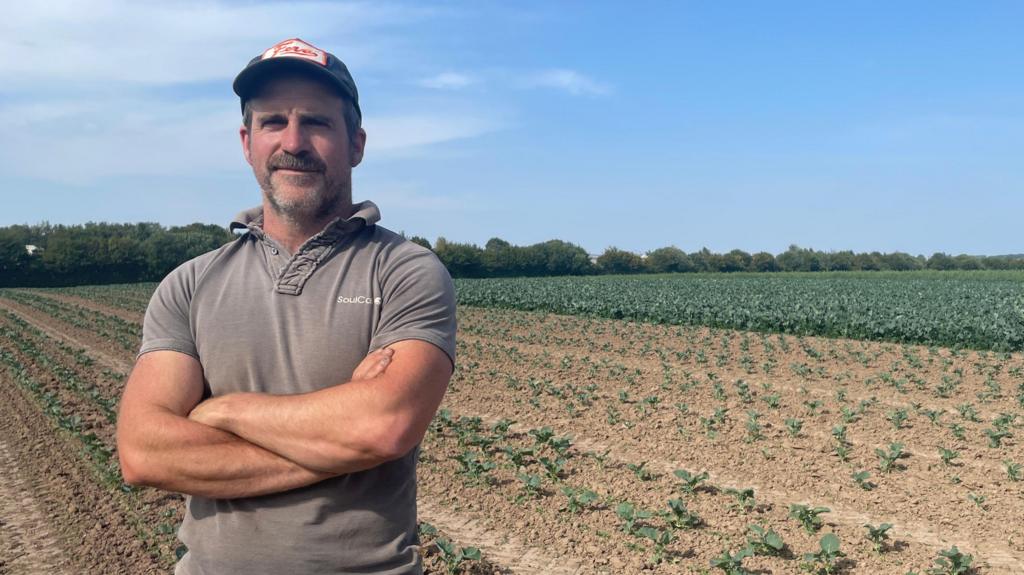“`html
Farmers in the driest regions of the UK are grappling with potentially record-breaking harvest losses as the ongoing heatwave severely impacts crop and vegetable yields.
Broccoli growers are particularly affected, facing critical water shortages and parched soils, leading to yield reductions exceeding 50%. This has also impacted produce quality, with consumers potentially seeing smaller vegetables available in stores.
A grower from Herefordshire cautioned the BBC about potential supply disruptions if substantial rainfall does not materialize promptly.
The British Growers Association has acknowledged “tight” supplies of brassicas, including broccoli, cauliflower, and cabbage. However, they suggest that more favorable harvests in wetter areas of the UK should help ensure continued availability in supermarkets.
The Energy and Climate Intelligence Unit (ECIU), an independent think tank, now projects that the UK is on track for one of its six or seven worst harvests in the last 40 years.
While the overall harvest outlook varies across the UK, farmers in regions experiencing minimal rainfall and low river levels are reporting significant shortfalls, particularly those cultivating crops in lighter, drier soils with poor moisture retention.
Ben Andrews, an organic farmer cultivating broccoli near Leominster, Herefordshire, indicated to the BBC that consumers may need to adjust their expectations regarding the size and appearance of supermarket vegetables.
He further suggested that the intense heat impacting brassica production abroad could also lead to import challenges and potential shortages in the UK.
“Availability might be somewhat reduced, and consumers may need to accept smaller heads of broccoli, lettuce, or cabbage.”
“I am uncertain about shelves being entirely empty, but if this situation persists, it is not entirely out of the question,” he stated.
The British Growers Association (BGA) characterized the summer as “another climatic challenge for growers,” adding that shortfalls from certain suppliers were being offset by producers cultivating more crops in regions with lower temperatures and increased rainfall.
Jack Ward, the BGA’s chief executive, noted: “In some areas, supplies of summer brassicas, cauliflowers, and cabbages are constrained.”
“Other root crops, carrots, and onions have been sustained through irrigation, but serious concerns exist regarding water supplies if the lack of rainfall continues.”
“At this stage, we are confident that crops will be available, but the weather events of the past three months underscore the increasing uncertainty surrounding our food supplies.”
Meanwhile, arable farmer Martin Williams, chairman of the National Farmers’ Union (NFU) Herefordshire branch, reported a 50% decrease in cereal yield, an anticipated loss of one-third of the normal potato crop, and a 70% reduction in grass grown for animal feed.
He described conditions as “absolutely, devastatingly dry” and is re-evaluating his future farming practices.
“Looking ahead, I am questioning the viability of growing cereal commodity crops.”
“Farming involves inherent risk, but if I can mitigate my risk by avoiding these high-risk crops, it is something I should consider,” he explained.
The National Farmers’ Union (NFU) described the extreme weather conditions this year as “unprecedented,” with the overall harvest picture currently exhibiting “significant variability.”
Jamie Burrows, chairman of the NFU’s crops board, indicated that farmers in regions with rainfall were experiencing “better-than-expected” yields, while others are “facing substantial declines that will have significant financial implications for their businesses.”
Tom Lancaster, the ECIU’s head of land, food, and farming, emphasized that consecutive years of extreme weather, characterized by both wet and dry conditions, are impacting farmers.
He told the BBC: “We should not view this year in isolation. It is part of a broader trend, following the second-worst harvest last year and the worst harvest on record in 2020.”
“It is this pattern that warrants concern, as the accumulating impacts on agriculture and farmers may eventually lead to farmers ceasing operations.”
NFU Scotland reports that this year’s ‘unusual weather’ has affected spring barley harvests.
A mobile food initiative is providing between 800 and 1,000 potatoes weekly to families in need.
Farmer George Atwell is encouraging others to seek support after experiencing depression.
Bluetongue regulations are eased in Wales, allowing vaccinated livestock to be transported to markets in England.
The National Drought Group classifies the current water shortages as a “nationally significant incident.”
“`

